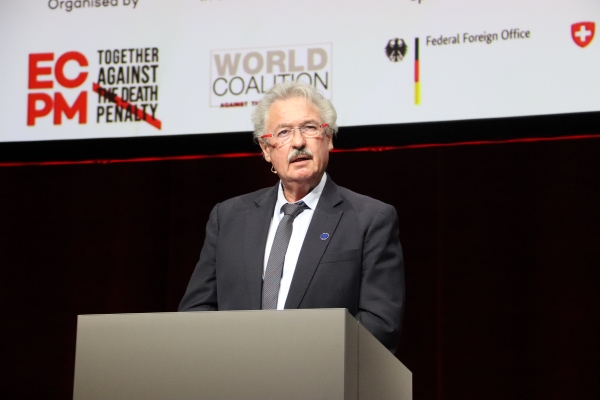 Jean Asselborn, Luxembourg's Minister of Foreign and European Affairs;
Credit: MAEE
Jean Asselborn, Luxembourg's Minister of Foreign and European Affairs;
Credit: MAEE
At the invitation of the Federal Minister of Foreign Affairs of Germany, Annalena Baerbock, Luxembourg's Minister of Foreign and European Affairs, Jean Asselborn, participated in the eigth World Congress Against the Death Penalty which started on 15 November 2022 in Berlin.
Organised by the association "Together against the death penalty" (Ensemble contre la peine de mort - ECPM), this congress brings together several European and international ministers as well as representatives of civil society with the aim of strengthening international commitment in favour of the abolition of the death penalty and to support initiatives in this direction.
After attending the opening ceremony, Minister Asselborn gave an introductory speech during the first plenary session devoted to "the instrumentalisation of the death penalty for political purposes". Minister Asselborn first wanted to congratulate the countries that have removed the death penalty from their legal arsenal in recent years: “This Eighth World Congress Against the Death Penalty marks a further step in our common effort to convince humanity that the death penalty no longer has a place in our time. I say additional step, because this effort, which began a few years ago, is bearing fruit. Since the last World Congress Against the Death Penalty held in 2019, several countries have abolished the death penalty, such as Burkina Faso, Chad, Kazakhstan, Sierra Leone and Papua New Guinea. In September 2022, Equatorial Guinea is the latest country to join the list. We warmly commend these countries for their efforts in our common cause and hope to see this trend accelerate.”
Minister Asselborn then recalled the importance of continuing to sensitise international public opinion and to encourage retentionist countries to change their approach, while indicating that NGOs, the media and civil society play a central role in this area.
Minister Asselborn underlined that Luxembourg, where the death penalty has been abolished since 1979, is opposed to the death penalty everywhere and in all circumstances and supports, through its bilateral contacts and within international and regional forums, the efforts diplomatic efforts to encourage the establishment of a moratorium on the death penalty, where it is still applied, with a view to complete abolition.
Recalling that the death penalty constitutes cruel, inhuman and degrading treatment, Minister Asselborn also pointed out that "the death penalty is no more dissuasive than the other penalties", before specifying that it "disproportionately affects the poor, minorities and political opponents, and is politically instrumentalised in some countries".
During his speech, Minister Asselborn notably mentioned the particularly worrying situation in Iran, one of the countries in the world where the number of executions is the highest in relation to its overall population. The minister condemned in the strongest possible terms the executions of people for belonging to political groups, referring to the pronouncement of the Iranian Revolutionary Court of a first death sentence linked to the recent demonstrations affecting the country. "This illustrates once again how inhumane and brutal the Iranian regime's repression against its own people is," said Minister Asselborn.
Similarly, Minister Asselborn condemned the recent use of the death penalty against political prisoners in Myanmar.








